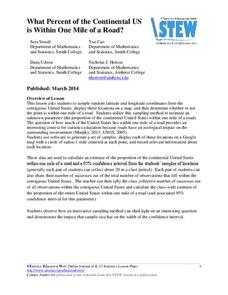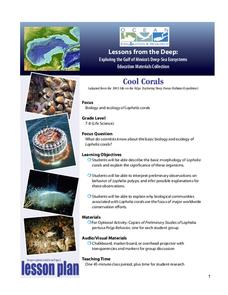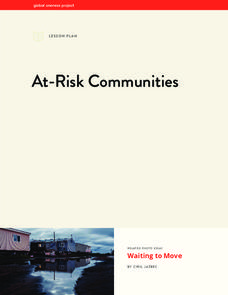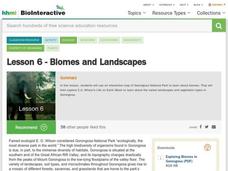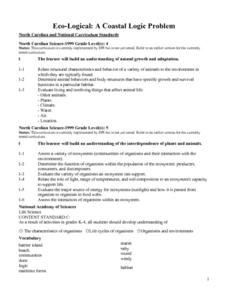Illustrative Mathematics
Logistic Growth Model, Abstract Version
Here learners get to flex some serious algebraic muscles through an investigation of logistic growth. The properties of the constant terms in the logistic growth formula are unraveled in a short but content-dense...
Statistics Education Web
What Percent of the Continental US is Within One Mile of a Road?
There are places in the US where a road cannot be found for miles! The lesson asks learners to use random longitude and latitude coordinates within the US to collect data. They then determine the sample proportion and confidence interval...
NOAA
Deep-Sea Ecosystems – Cool Corals
Young oceanographers research deep sea corals that thrive on chemosynthesis. The lesson plan focuses on the biology of the animal, preferred habitat, associations, and interactions.
Energy for Keeps
Renewable Energy Action Project: What's in Your Energy Portfolio?
Uncover the renewable energy potential in your region. The activity outlines an approach to research current practices and trends. Learners conduct surveys to assess the attitudes of the local population and prepare a paper summarizing...
Chicago Botanic Garden
Faces of Climate Change
How does climate change affect you? First in a three-part series, the activity focuses on how individuals living around the world are affected by climate change. Individuals take on the role of a given character and share their...
Chicago Botanic Garden
Introducing Ecosystem Services
Purifying air and water, providing soil in which to grow crops, and moving water through its natural cycle are all services an ecosystem provides that benefit humans. Lesson four in a series lets learners explore and discuss the value of...
Chicago Botanic Garden
Personal Choices and the Planet
The last activity in the series of four has individuals determine steps they can take to reduce their carbon footprints and then analyze their schools' recycling programs. Through a sustainability audit, they identify how and where their...
Chicago Botanic Garden
Introducing Ecosystem Services
Ecosystems provide many things humans not only use but also need in order to survive. The last instructional activity in the series of seven introduces scholars to the idea of ecosystem services, that ecosystems provide humans with many...
Global Oneness Project
At-Risk Communities
"Waiting to Move," a photo essay by Ciril Jazbec, brings into sharp focus the threats posed by climate change. Class members examine images of Shishmaref Island and the Native Alaskan Inupiate coastal villages that are impacted by rising...
Global Oneness Project
Rethinking the Fabrics We Wear
What are fibersheds and what what do they have to do with environmental protections? A photo essay and audio recordings about Mimi Luebbermann, and her sheep, cause consumers to reflect on how their clothing choices can support local...
LABScI
Taxonomy: Who is in My family?
Find similarities in seemingly unlike organisms. The second instructional activity in a series of 12 builds the concept of a taxonomy and explores the use of a dichotomous key. Learners begin in part one by attempting to group a set of...
LABScI
Population Dynamics: The Predator-Prey Lab
Wolves eat better when the bunny population increases, but how long does that last? A series of 12 biology lessons uses the sixth installment to explore the predator-prey relationship between bunny and wolf populations. Young scientists...
LABScI
Botany: The Plant Dissection Lab
Study everything about plants! The 12-part series of lessons continues with an examination of many aspects of plants. Components of the laboratory activity address the growth and structure of plants by evaluating familiar plants. The...
Howard Hughes Medical Institute
Lesson 6: Biomes and Landscapes
Aside from the amazing animals in Gorongosa National Park, what else is there to discover? The sixth installment in an eight-part themed series contains an interactive map where scholars can learn more about the geographic features of...
Montana State University
Everest Extremes: Biodiversity
How many animals can live in a climate as cold as Mount Everest's? Find out with a science lesson all about biodiversity. Activities include research, presentations, group work, coloring maps, and a simulation of a food web.
Population Connection
Meeting Human Needs
How to meet the needs of people around the globe—a question many ask. The fifth in a six-part series about human population and its effects on the globe, the eye-opening lesson includes discussion, a homework activity, and an in-class...
Serendip
Food Webs, Energy Flow, Carbon Cycle, and Trophic Pyramids
The reintroduction of a species to an area doesn't always go as expected. Scholars learn about the reintroduction of wolves into Yellowstone National Park with a video, reading, and discussion questions. They complete a hands-on activity...
Serendip
Evolution of Fur Color in Mice – Mutation, Environment and Natural Selection
Most species of animals include a variety of fur or hair color, but why? Scholars watch a video about a changing environment for mice. As the rocks around them change hues, different colors of mice begin to thrive. Discussion questions...
Curated OER
Carbon and Oxygen Cycles
Students construct their own diagrams outlining the pathway of carbon and oxygen in the atmosphere. Students explain their diagrams outlining the pathway and teacher checks for accuracy and completion.
Curated OER
Eco-Logical: A Coastal Logic Problem
Fourth graders study the characteristics of five coastal communities. They use logic cards and matching activities to identify the proper community for plant and animal species.
Curated OER
Predator and Prey Game
Young scholars explore the why the balance among producers, predators and prey is necessary in order for an ecosystem to be sustained over time. Through web games and activities, they discover how each component of the food chain works...
Curated OER
Food Chains, Food Webs, Biomass Pyramids and Cycle
In this food chains worksheet, students complete a crossword puzzle by placing 16 terms into the puzzle that match the clues given. Students review food webs, biomass pyramids, and the water cycle.
Curated OER
Food Chains and Webs
In this food chains worksheet, students identify the producers and consumers in the given food chains and describe how contaminants can biologically accumulate. This worksheet has 4 short answer questions.
Curated OER
Winter Survival
Students examine what animals need in order to survive. In this investigative lesson students play a "role" of an animal in winter.
Other popular searches
- Population Ecology
- Animal Ecology
- Human Ecology
- Behavioral Ecology
- Ecology Principles
- Community Ecology
- Pond Ecology
- Ecology Organizations
- Global Ecology
- Ecology Ethics
- Ecology Food Webs
- Ecology and Plants

